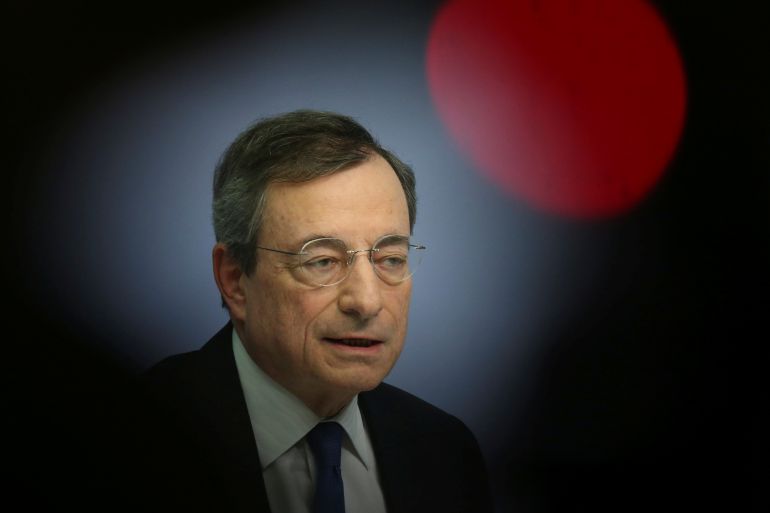Italy: Ex-ECB chief Draghi ‘confident’ he can form government
Amid Italy’s political crisis, Draghi, 73, has been asked to form a government to replace caretaker PM Conte’s coalition.

Former European Central Bank President Mario Draghi has accepted the task of trying to form a new government to end a long-running political crisis and said he was “confident” of securing sufficient backing in the Italian parliament.
In a brief statement after receiving the mandate from President Sergio Mattarella, Draghi said the country faced “a difficult moment”, battered by the economic and coronavirus crises.
Keep reading
list of 4 itemsItalian prime minister resigns as political crisis deepens
Italy: Renzi quits coalition, sparking political crisis
A year after the pandemic struck, Italians reflect on their grief
“I will look to parliament, the expression of the popular will, with great respect,” Draghi said.
He added that he hoped for unity from political forces as well as society at large, and would return to Mattarella to tell him of the outcome of his talks.
He did not give any timeframe.
“I am confident that … unity will emerge and with it the ability to give a responsible and positive answer to the appeal of the President of the Republic,” he said.
Draghi will attempt to form a non-political government to replace caretaker Prime Minister Giuseppe Conte’s failing coalition of the Five Star Movement and Democratic Party.
Conte was forced to resign last month after ex-Prime Minister Matteo Renzi pulled the ministers of his small, centrist Italia Viva (Italy Alive) party from Conte’s government.
Renzi, whose nickname is “il rottamatore”, or “the demolisher”, complained, among other things, about Conte’s plan to spend more than 200 billion euros ($240bn) in EU funds and loans to help the economy recover from the pandemic.
Renzi, who was prime minister from 2014-2016, blamed Conte’s forces for the failed negotiations, saying they had rejected his proposals.
He suggested he was pleased with the outcome, praising Mattarella’s “wise” decision.
A sombre Mattarella told the nation on Tuesday night that while early elections were a possible outcome and a necessary “exercise in democracy”, they would be ill-advised at this crucial time in Italy’s history.
Italy, with more than 89,000 confirmed coronavirus deaths, has the second-highest COVID-19 death toll in Europe after the United Kingdom. It is trying to ramp up its vaccination campaign and must report back to the EU on how it plans to spend the recovery funds.
“It is, therefore, my duty to make an appeal to all the forces in the parliament so that they grant the confidence to a high profile government not linked to any political force,” Mattarella said.
Italy, the third-largest economy in the EU, had been heading into a recession even before it became the first country in the West to be hit by COVID-19 last February.
The ensuing economic devastation has only made matters worse, with gross domestic product (GDP) falling 8.8 percent last year and nearly 450,000 jobs lost, national statistics agency ISTAT reported this week.
After the government crisis erupted, Mattarella asked the president of the lower Chamber of Deputies, Roberto Fico, to sound out political leaders to see if an alternative coalition could be formed. Fico reported back on Tuesday evening that he had failed, and Mattarella then summoned Draghi.
The right-wing opposition, which had been leading the polls prior to the government tumult, still pressed for an early election, though the Forza Italia party of ex-Prime Minister Silvio Berlusconi indicated its support for a “high-profile” government.
‘Super Mario’ Draghi
Draghi is known as “Super Mario” for having rescued the common currency during Europe’s debt crisis.
During Europe’s debt crisis in 2012 and as Italy was facing unsustainably high borrowing costs that threatened its financial stability, Draghi said in July 2012 the ECB was ready to do “whatever it takes” within its mandate to preserve the euro.
It proved to be a turning point for Europe.
Draghi, a Massachusetts Institute of Technology-trained economist, led the Italian central bank from 2005-2011 when he was tapped to lead the ECB, a job he held until 2019.
Prior to that, he had been a vice chairman and managing director at Goldman Sachs International in London and an executive director at the World Bank.
Al Jazeera’s Stefanie Dekker, reporting from the Italian capital, Rome, said Draghi faced a big challenge.
“It’s easier for him to negotiate the economy and money than dealing with Italy’s politicians,” she said.
“We have to ask the question whether he will have support in parliament to push through any legislation because there is still bickering between the parties here, and some of them don’t like technocrats.”